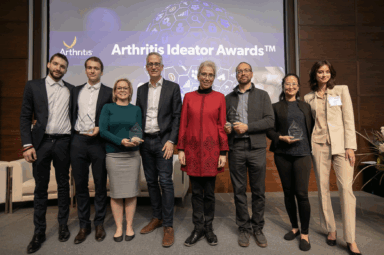The fire of arthritis scorches lives. It robs six million Canadians of their mobility, mental and physical well-being, and in some cases, their livelihood. It is Canada’s most common chronic condition, and there is no cure. Arthritis is a problem desperately looking for innovative solutions.
Thanks to the support and generosity of our funders, Arthritis Society Canada is fueling transformational change to fight the fire of arthritis.
Through our Innovation Strategy, we are unlocking research breakthroughs by talented scientists, unleashing system change through social impact projects and uncovering and accelerating entrepreneurial ideas to help people living with arthritis today and in the future.
Three Pillars
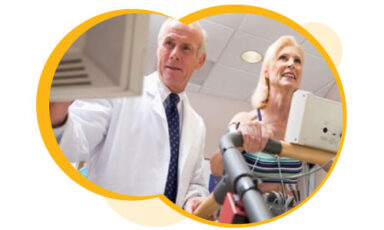
1. ResearchArthritis Society Canada supports exceptionally creative scientists pursuing breakthrough research with the potential to unlock novel, transformative, lasting impacts. Last year, we committed more than $4.1 million to 13 Strategic Operating Grants and a further $1.2 million to 12 high-risk, high-reward Ignite Research Grants – all aimed at unlocking better diagnoses, treatment and management of arthritis, and ultimately, a cure for the disease. |
|
|
|
Learn more about Arthritis Society Canada’s partnership with Creative Destruction Lab
Innovation Fund
We have a disease to crush. Transformational innovation will drive this change.
Investing in Arthritis Society Canada is an investment in our vision to extinguish arthritis by disrupting the status quo. For too long, health charities like ours have played it safe. With rapid changes in healthcare technology, care delivery and treatment options – coupled with the dramatic rise in arthritis diagnoses expected in the next 20 years – safe is no longer an option.
We are bold changemakers. The Arthritis Society is the only organization in Canada that has the scope and the vision to accelerate the innovations needed to extinguish this debilitating disease for good.
Thank you to our generous supporters who are kickstarting this fund
Diane Blake & Stephen Smith
Andrew Branion
The O’Sullivan Family
Pfizer
Meet the Executive Volunteers of our Innovation Fund Committee

Sulemaan Ahmed |

Trish Barbato |

Andrew Branion |

Vikram Devdas |
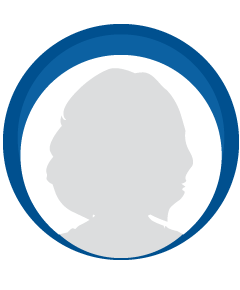
Martha Harrison |

Brent Norton |
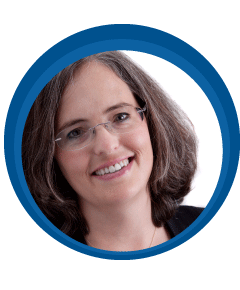
Melanie Philip |
Arthritis Ideator Awards
2022 Awards
Congratulations to the four innovators who were selected as winners of the Arthritis Society Canada’s inaugural Arthritis Ideator Awards on April 21, 2022! Each received $50,000 to help bring their ideas to life and help fight the fire of arthritis.
Here’s a progress report, one year after winning their Award.
Find out more about their individual projects below. We are grateful for each of the impressive 21 submissions that were received.
The idea: OPERAS
The ideator: Dr. Linda Li
The solution: An app-based program to empower active self-care, capturing information on the go, and providing trends on symptoms, disease activity and treatments for people with arthritis.
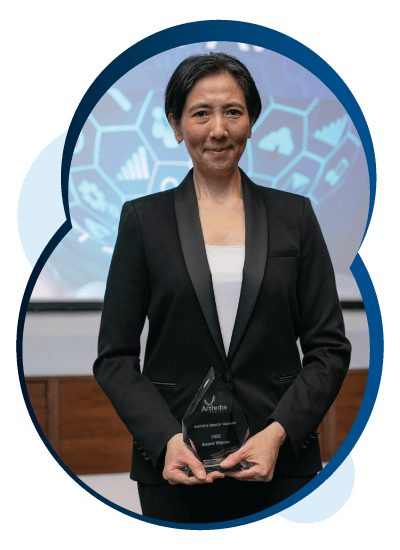 Dr. Linda Li, a professor and researcher at Arthritis Research Canada, is also a licensed physiotherapist who has treated many patients with rheumatoid arthritis.
Dr. Linda Li, a professor and researcher at Arthritis Research Canada, is also a licensed physiotherapist who has treated many patients with rheumatoid arthritis.
“Over the years, I have heard from people that it’s hard to recall and describe changes in their symptoms to their healthcare providers, especially when they are tired and in a lot pain during a clinic visit,” Li says.
This vagueness about their symptoms and its patterns led Li and her colleagues to create OPERAS, a web platform that allows people living with rheumatoid arthritis to track and monitor their symptoms to get a full picture of their health and any patterns that emerge.
“Eight years ago, we worked with a group of patients with arthritis and did a survey about how digital technology could help. What we learned was that people wanted to use technology to help track their day-to-day symptoms and manage their health,” says Li. “This inspired us to develop a digital platform for people to see their symptoms in patterns. When people can see their own patterns between what they do and how they experience their symptoms over time, they are better equipped for self-care.”
Li and colleagues will use Arthritis Society Canada’s Olga Munari Arthritis Ideator Award funding to do a full market assessment to determine the commercialization and go-to-market strategy for the OPERAS platform. About one of every 100 adults in Canada has rheumatoid arthritis and could benefit from it.
“Knowing we have the possibility to move something from the research space into the hands of people and healthcare professionals is thrilling,” Li says. “We are so happy to have this opportunity.”
The idea: WithinStride®, by PROVA Innovations
The ideator: Matthew Rosato
The solution: ‘Smart’ in-soles that aid in gait rehabilitation for people with early- and mid-stage knee and hip osteoarthritis.
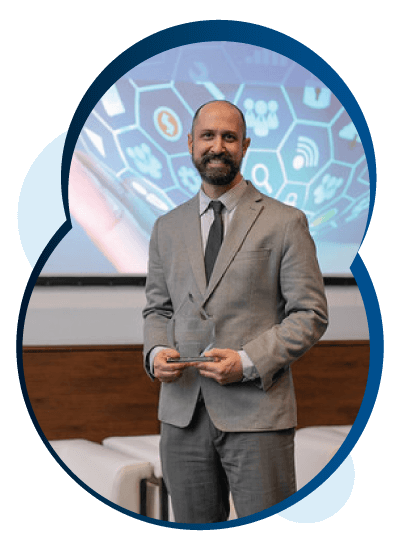 Matthew Rosato’s career as an entrepreneur and innovator was inspired by accompanying his son, who lives with cerebral palsy, to physiotherapy.
Matthew Rosato’s career as an entrepreneur and innovator was inspired by accompanying his son, who lives with cerebral palsy, to physiotherapy.
“I would watch our therapist correct my son’s gait using her hands and voice, guiding his feet in clinic, but had no way to reinforce these movements at home,” says Rosato, an aerospace engineer.
“I realized that motor memory is only learned through repetition and practice and that these improper movements were putting more stress on his joint. There’s a strong likelihood he may develop early hip and knee osteoarthritis.”
Rosato was determined to make it easier for people with early hip and knee osteoarthritis to learn better movement patterns at home and PROVA Innovations was born. Rosato and his team have created the WithinStride® gait training system, the heart of which are wearable insoles that provide real-time gait analysis and training through sensory prompts that correct gait as individuals go through their daily activities.
“This is a non-pharmaceutical, non-surgical method of changing behaviour and aims to reduce the wear and tear on joints,” Rosato says. “The goal is to slow down the progression of the disease and allow gait retraining to happen in a home environment.”
Four million Canadians live with osteoarthritis, and weight-bearing joints such as the knee and hip are most commonly affected.
WithinStride®’s mobile app allows individuals and clinicians to set goals, track progress and provide customized treatment plans.
“It’s an intuitive, non-invasive way to change movement,” Rosato says.
He plans to use his Arthritis Society Canada Ideator Award funding to conduct a clinical trial this fall.
“This award is a big deal for our team,” Rosato says. “Having Arthritis Society Canada as a long-term partner is fantastic. It really is a validation of our work and creates opportunities for PROVA to move forward.”
The idea: KneeKG, by Emovi
The ideators: Michelle LaFlamme and Alex Fuentes
The solution: A dynamic tool for diagnosing knee osteoarthritis by examining biomechanical markers while the knee is in motion, enabling custom treatment plans.
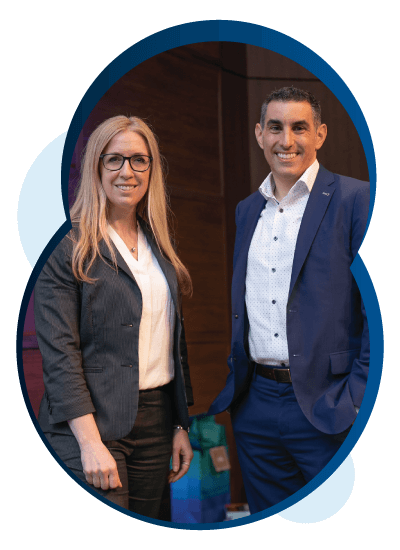 Having participated in sports activities throughout her life, lawyer and entrepreneur Michelle Laflamme viewed knee pain simply as “part of life”; Knee problems are prevalent, and determining the real problem is often a process of elimination for clinicians because nobody can see inside the knee.
Having participated in sports activities throughout her life, lawyer and entrepreneur Michelle Laflamme viewed knee pain simply as “part of life”; Knee problems are prevalent, and determining the real problem is often a process of elimination for clinicians because nobody can see inside the knee.
In 2007, Laflamme met a group of orthopedic surgeons and biomedical science researchers, including Alex Fuentes, who also saw the need for better tools to accurately examine the knee. It is known that even one degree of malalignment can cause stress on the knee, and it is not possible to pick this up with the naked eye or in gait labs. These doctors and researchers created a testing device fitted to examine the knee dynamically, identifying biomechanical markers that indicate causes of pain and symptoms. The exam then suggests a personalized and targeted treatment plan.
Laflamme expressed interest in acquiring and commercializing the device, known as ‘KneeKG.’ Emovi was born in 2008 and Fuentes, part of the research team, joined the fledgling company.
“KneeKG testing can indicate the problem, suggest a treatment plan, and indicate the appropriateness for surgery,” says Fuentes. “This has been proven to reduce pain, improve outcomes and improve quality of life. In Canada, we have also demonstrated that it can reduce waiting lists for the number of people waiting to see a surgeon.”
Presently, only 59 per cent of Canadians requiring knee joint replacements receive them within the six-month recommended timeframe, causing unnecessary, excruciating pain. More than 75,000 Canadians had knee replacements last year.
Today, KneeKG is commercialized in the United States, Europe and Canada, but reimbursement for the exam hasn’t yet been approved in Canada. Laflamme and Fuentes plan to use the funding from the Arthritis Society Canada’s Ideator Award to work with Arthritis Society Canada to establish an expert panel that can advocate for that change in each province.
“We want to make this happen for patients,” says Laflamme. “I’m passionate about innovation in the medical community, bringing better care to patients and making their lives simpler.”
Adds Fuentes, “More and more, clinical guidelines support the value of biomechanical markers and the need to assess them with objective and accurate data. Having the support of Arthritis Society Canada is very important for us.”
The idea: Guided Hands, by Imaginable Solutions
The ideator: Lianna Genovese
The solution: An assistive device that guides hand movements to enable people with limited hand mobility to write, paint, draw and access technology through a touch-screen device.
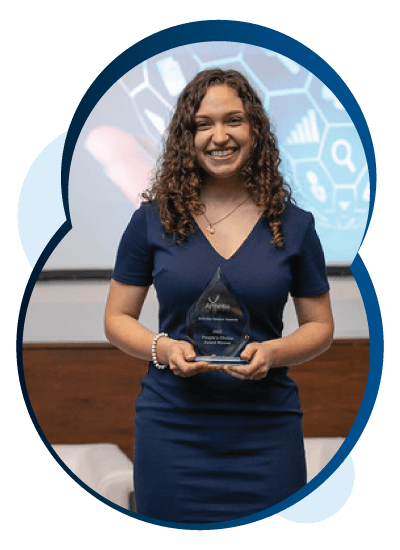 An introduction to Elissa, a painter living with cerebral palsy, first inspired Lianna Genovese to design an assistive device to improve hand mobility as an assignment during her first year of engineering school.
An introduction to Elissa, a painter living with cerebral palsy, first inspired Lianna Genovese to design an assistive device to improve hand mobility as an assignment during her first year of engineering school.
When the design not only had an impact, but won first place in a Canadian student competition, Genovese realized she could also help others with limited hand mobility and an entrepreneurial venture was born.
“I decided I wanted to help people and tried to find other Elissas – people with mobility issues due to arthritis or Huntington’s disease, for instance,” says Genovese, winner of the Arthritis Society’s inaugural People’s Choice Arthritis Ideator Award.
Her device, Guided Hands, uses a sliding system and 3D printed handpieces tailored to the user that allows them to express themselves on a touchscreen or in painting, writing and drawing. It also offers an opportunity to build confidence and independence.
Throughout her undergraduate career as a biomedical and mechanical engineering student, Genovese led a double life: student and entrepreneur. When she wasn’t doing coursework, she was applying for grants and patents and working in the family basement building the devices herself.
Genovese plans to apply the funding from her Arthritis Society Ideator Award towards marketing and manufacturing Guided Hands to continue selling her product across North America. She now uses a Canadian manufacturer and recently hired her first employee. She has a team of engineering students assisting with research and is “well supported by mentors who can guide me and lift me up.
“Winning the People’s Choice Award was unbelievable,” she says. “Having people who understand the pain of arthritis cheering me on and believing in the solution is wonderful, and being involved with Arthritis Society Canada opens so many doors.”
Other Arthritis Ideator Awards highlights
|
Enjoy these highlights from the menu served at the Arthritis Society’s inaugural Arthritis Ideator Awards. The menu was specially designed by Vikram Vij and created by Marie Brennan of Gourmade Thyme Catering. Every recipe offers anti-inflammatory properties.
Thank you to our catering partner

Ingredients
- ¾ cup plain yogurt
- 1 tablespoon tamarind paste
- 3 tablespoons garlic, finely chopped
- ¼ cup canola oil
- 1 ½ teaspoons salt (or to taste)
- 1 ¼ teaspoons ground cayenne pepper
- 1 tablespoon garam masala or 1 tablespoon ground cumin
- 2 ¼ lbs. boneless chicken thighs, approx. 6 oz per serving
- 1 lemon, cut into 6 wedges (optional)
Instructions
- In a large mixing bowl combine the yogurt, tamarind, garlic, canola, salt, cayenne and garam massala.
- Add the chicken, mix and make sure the chicken is covered with the marinade.
- Cover and marinate for a minimum of 4 hours but 8 is preferred.
- Preheat a grill, barbeque or stovetop cast-iron grill to high heat.
- Grill the thighs 2 minutes on each side, then again 2 minutes on each side.
- Check that the thighs are done, if still pink continue grilling. Serve with the lemon wedges.
Note
- Tamarind paste should be as thick as jam, if thinner use up to 1 tablespoon more.
Ingredients
- 1 can chickpeas drained
- 2/3 cups black tahini
- Zest and juice of 2 lemons or 3 ~ you want about 1/3 cup of lemon juice
- 2 garlic cloves chopped
- 1/3 cup olive oil
- 1 ½ teaspoons honey
- 1 teaspoon cumin or more to taste
- 1 teaspoon kosher salt
- 1 handful chopped parsley or other herbs such as za’atar, sumac, pomegranate arils, nuts or seeds as topping + a swirl of extra virgin olive oil
Instructions
- Combine the chickpeas, tahini, lemon juice, lemon zest, garlic, honey, cumin and salt in a high-powered blender.
- With the motor running, slowly drizzle in the olive oil and blend until smooth.
- Taste and adjust seasoning as needed, adding more olive oil, lemon juice, garlic, cumin or salt as needed.
- Serve in a bowl and sprinkle with desired toppings and a swirl of extra virgin olive oil, alongside pita chips or crudites for dipping.
Notes
- If you have a blender, now is the time to use it! If you don’t, a food processor or lots and lots and lots of elbow grease will work too.
- If using store-bought black tahini, go for the organic kind.
- Dried chickpeas will create a better flavour than canned but takes more time.
- Get playful with toppings.
- Leftover hummus will keep in the fridge for a week.
- Hummus will thicken up in the fridge, so dilute with 1 tablespoon of cold water at a time until you get your perfect consistency again.
Ingredients
- 2 large aubergines (eggplants) cut in half lengthwise (about 500 g each)
- 2 cloves garlic, sliced into half lengthwise
- Sprigs of rosemary and thyme
- Extra virgin olive oil
- ½-¾ cup sour cream or to taste
- 2 tablespoons finely chopped coriander
- A squeeze of fresh lemon juice (1-2 tablespoons)
- Salt and freshly ground pepper to taste
Instructions
- Cut one eggplant into two halves lengthwise and remove the stem end. Score each cut half in a criss-cross fashion and then rub the surface with one sliced garlic.
- Break little sprigs of rosemary and thyme and using the stalks, stick several rosemary sprigs on one half the aubergine and several thyme sprigs on the other half. Sprinkle each half with salt and liberally drizzle olive oil over.
- Place the sliced garlic in the middle and put the halves back together. Wrap the aubergine tightly with aluminum foil and set aside. Repeat the procedure with the remaining aubergine.
- Bake at 400ºF (200ºC) for 40-60 minutes or until fully cooked, wilted and collapsed. The flesh should be very soft and easy to scoop.
- Scoop out the flesh with a spoon, remove the large stalks of rosemary and thyme.
- Chop the scooped-out flesh finely with a large knife.
- Heat 1-2 tablespoons olive oil in a pan or skillet and cook the flesh over medium high heat until lightly browned, about 1 minute.
- Remove from the heat and add the sour cream, coriander and a squeeze of lemon juice. Stir to combine everything. Season with salt and freshly ground pepper to taste. Adjust seasoning to your taste.
- Cover and place in the fridge until required (a few hours and up to 3 days).
- Serve with some garlic bread or breadsticks or veggies stalks.
Thank you to the VIP panel of judges who embraced this competition with enthusiasm.
- Mohamad Fakih, Award-winning restauranteur, business leader and philanthropist
- Ronald Reuben, Founder, CEO and Chair, Medicom Group
- Vikram Vij, Chef and owner of Vij’s restaurants, author and former Dragons’ Den investor
- Nick Yardley, MD, FRCSC, Orthopedic surgeon and Board member, HaloHealth
- Trish Barbato, President and CEO, Arthritis Society
2023 Awards
Congratulations to the four innovators who were selected as winners of Arthritis Society Canada’s 2023 Arthritis Ideator AwardsTM on April 20, 2023! Each will receive $50,000 to help bring their idea to life.
Find out more about their individual projects below.
As a web-based medical intake platform, FirstHX integrates with a physician’s electronic health records, empowering people with arthritis to use their own smart phones to provide more robust information while also reducing medical errors and enhancing clinical efficiency. Learn more.
Launched by Cassandra Hui, Heal Mary is a digital tool that leverages machine learning to engage and support people with arthritis during the often-complicated search and application process for a clinical trial that might benefit their health. Learn more.
Because more than 99 per cent of people have genetic variations which affect their response to different medications, Pillcheck combines clinical pharmacy services with DNA analysis to help quickly find the right medication in the right dosage for people living with arthritis and other diseases. Learn more.
Developed by physiotherapists, Joints on Point is a mobile app and web platform delivering educational videos and exercise programs for the knee, hip, low back and wrist to improve the confidence, motivation and symptoms of people living with osteoarthritis. Learn more.
Arthritis Ideator Awards 2023 Finalists
Putting innovative ideas into action
Launched in 2022, the Arthritis Ideator AwardsTM uncovered and partnered with bright entrepreneurial talent as they invent and tailor practical solutions that could transform the lives of people living with arthritis. In 2024, Arthritis Society Canada and Creative Destruction Lab (CDL) at the University of Toronto’s Rotman School of Management formed a partnership to strengthen support for trailblazing innovators.
Meet the finalists
 Based in Windsor, Ont.
Based in Windsor, Ont.
Inspired by his own experience with arthritis, Stefan Gertz and his team at Cadence Health Analytics, have developed an app that helps healthcare professionals provide more timely care by analyzing real-time patient self-assessment data, while increasing patient engagement in care. Learn more.
 Based in Fredericton, N.B.
Based in Fredericton, N.B.
lex Roberts, Sarah Diaz and Dr. Erik Scheme created eNable Analytics, sensor technology that augments walking aids such as canes and walkers and integrates with a mobile app to monitor the gait of people with arthritis, to predict falls and motivate them to meet their physical activity goals. Learn more.
 Based in Toronto, Ont.
Based in Toronto, Ont.
As a web-based medical intake platform, FirstHX integrates with a physician’s electronic health records, empowering people with arthritis to use their own smart phones to provide more robust information while also reducing medical errors and enhancing clinical efficiency. Learn more.
 Based in Vancouver, B.C.
Based in Vancouver, B.C.
Launched by Cassandra Hui, Heal Mary is a digital tool that leverages machine learning to engage and support people with arthritis during the often-complicated search and application process for a clinical trial that might benefit their health. Learn more.
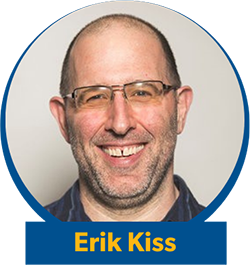 Based in Vancouver, B.C.
Based in Vancouver, B.C.
Imaging Reality is an immersive virtual reality experience narrated by a rheumatologist that will help newly diagnosed osteoarthritis patients better understand their diagnosis, ease their anxiety and support compliance with their treatment plan. Learn more.
 Based in Ottawa, Ont.
Based in Ottawa, Ont.
Developed by physiotherapists, Joints on Point is a mobile app and web platform delivering educational videos and exercise programs for the knee, hip, low back and wrist to improve the confidence, motivation and symptoms of people living with osteoarthritis. Learn more.
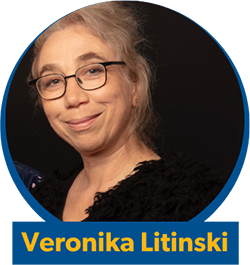 Based in Toronto, Ont.
Based in Toronto, Ont.
Because more than 99 per cent of people have genetic variations which affect their response to different medications, Pillcheck combines clinical pharmacy services with DNA analysis to help quickly find the right medication in the right dosage for people living with arthritis and other diseases. Learn more.

Mohamad Fakih |

Jasmin Ganie-Hobbs |

Andrew Oliver |
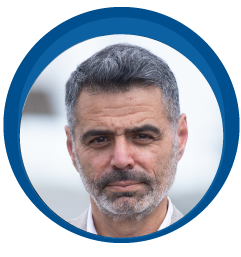
Ronald Reuben |

Trish Barbato |
Thank you
Thank you to you and our judging panel for selecting our winners. You were one of more than 3500 people who added their voice to this important competition aimed at fighting the fire of arthritis for the 6 million Canadians living with the disease.
Innovation is key to transforming arthritis care.
And thanks to the generosity of our donors and supporters, Arthritis Society Canada is accelerating great ideas through our Arthritis Ideator AwardsTM.


 3. Ideator Program
3. Ideator Program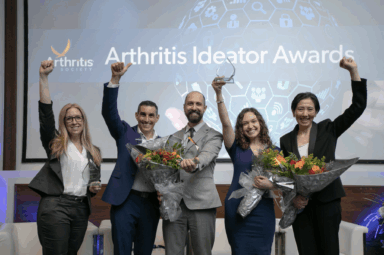 Check out the photo gallery
Check out the photo gallery